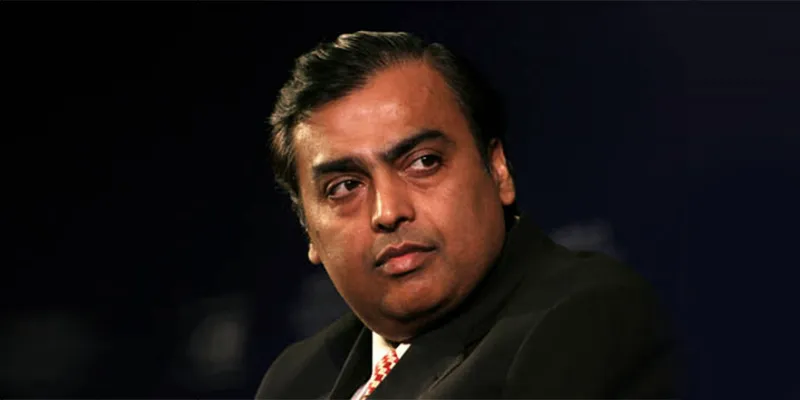India at cusp of becoming premier digital society: Mukesh Ambani
Speaking at a fireside chat with Microsoft CEO Satya Nadella, Mukesh Ambani said the big change driving this transformation was the deepening of mobile networks, which were working at a much faster pace than before.
With mobile networks better or at par with anywhere else in the world, India has an opportunity to become a 'premier digital society', billionaire Mukesh Ambani said on Monday as he saw the country becoming the third world's largest economy within the next decade.
Speaking at a fireside chat with CEO Satya Nadella, he said the big change driving this transformation was the deepening of mobile networks, which were working at a much faster pace than before.

"I can easily say that the mobile networks in India now are better or at par with anywhere else in the world," he said. "The opportunity that we have for India, really, is the opportunity to become the premier digital society in the world."
India, he said, has all the components in place to "grow and march forward".
"I have no doubt in my mind that we will be among the top three economies in the world," he said. "We can argue about whether it will happen in 5 years or 10 years but it's going to happen, and we will be in the top three economies in the world."
When that happens, he wondered: "Will we be the most technologically enabled society? Will we be having all our development enabled by all the tools of technology? Can we really be a pacesetter in terms of using all technology?"
India became the world's fifth-largest economy last year, according to IMF. When ranked by nominal GDP, the country leapfrogged France and the UK and now ranks behind the US, China, Japan, and Germany.
India's GDP growth has been among the highest in the world in the past decade regularly achieving annual growth of between 6-7 percent.
When Nadella joined Microsoft in 1992, the Indian economy was $300 billion. "Today, India is $3 trillion," said Ambani, Chairman of Reliance Industries. "And fundamentally, this whole progress, in a certain way, has happened on the back of technology."
In the early days, it was Tata Consultancy Services and Infosys which drove technology which kick-started the financial and economic reforms, he said. "It was supercharged in 2014 when Prime Minister (Narendra Modi) gave us the vision of Digital India."
What followed was for everyone to see.
"I was privileged to play a very small role in it, in terms of the launch of Jio," he said, adding that prior to the launch of Jio in 2016, average internet access speed was 256 kbps and post Jio is now 21 mbps on mobile data in every single village in India.
"The pre-Jio, price of data in this country was between Rs 300 and 500 per GB. And for the poorest of poor people who use 2G, the prices were as high as Rs 10,000 a GB. Post Jio, the price is between Rs 12 and Rs 14 a GB," he said adding 380 million customers have migrated to 4G technology on Jio platform in the last three years.
"We just introduced UPI and did digitisation in December. We had 100 percent growth and total UPI transactions in this country were Rs 2 lakh crore," he said. "We are accelerating and we are just at the beginning of this whole journey."
The richest Indian saw gaming as the next big game changer as it will be bigger than music, movies and TV shows all put together.
He said technology presents an opportunity to transform India.
"We in India have the opportunity to become the premier digital society," he stated. "The next generation will see a very different India than what you (Nadella) and I have grown up in."
Referring to Donald Trump's visit, he said the US President will see "in 2020 a very different from the India that neither President Carter saw nor (President) Bill Clinton saw or even Barack Obama."
Millions who came on the street to welcome Trump have their own personal experience of strong enough networks on their mobile phones, he said adding the construction of the world's biggest cricket stadium is an example of infrastructure being created.
"The stadium, in terms of digital, is better than any other place in the world," he said.
Ambani said Reliance was founded by his father Dhirubhai as a startup five decades ago with just a table and a chair and Rs 1,000 in capital. It rose to first become a micro-enterprise and then to small industry and now a large enterprise.
"Why I'm saying this is fundamentally to just drive the point that every small business and entrepreneur has the potential in India to become a Dhirubhai Ambani or Bill Gates. And that is the power, that is what differentiates India, from the rest of the world," he said. "I think that the entrepreneurial power that we have at the grassroots is enormous."
Small and medium enterprises provide employment to 70 percent of Indians and drive 40 percent of the country's exports.
"And they are critical to all the economic activity that we see. They have had done this, again, with zero technical enablements and adoption. So the opportunity there is to really go from low technology, low digitisation, and really to adopt" technology to really propel India forward, he said.
Ambani also praised Nadella for his leadership at Microsoft that has made every Indian "very, very proud", saying his style of empathy and that of partnerships, building trusts, and relationships as also considering every mistake as a learning opportunity and believing that its people who are the strength of the organisation and not the profits or products, inspired him.
(Edited by Megha Reddy)








